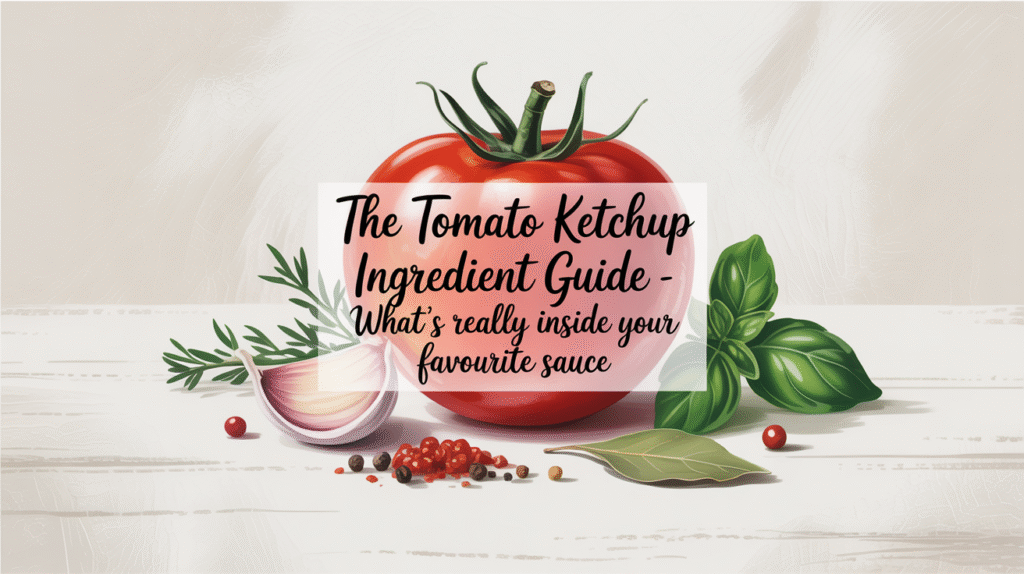Affiliate Disclosure: PantryBrands.co.uk is a participant in the Amazon.co.uk Associates Programme. As an Amazon Associate, we earn from qualifying purchases made through links on this site.
The key ingredients in tomato ketchup are tomatoes, vinegar, sugar, salt, and spices — but the exact combination can vary depending on the brand or recipe. While it seems like a simple condiment, ketchup has a carefully balanced formulation that gives it its signature flavour and long shelf life.

This guide breaks down the common ingredients found in tomato ketchup, explains their roles, and explores how different formulations can affect taste, nutrition, and health.
What Are the Main Ingredients in Tomato Ketchup?
At its core, tomato ketchup contains a small set of essential ingredients that create its sweet, tangy, and savoury profile.
Core Ingredients in Most Tomato Ketchup Brands
These ingredients form the base of nearly all commercial and homemade ketchup products:
- Tomato concentrate or purée: Usually made from ripe tomatoes or tomato paste. This forms the main body of the sauce and provides colour, flavour, and thickness.
- Vinegar: Often spirit vinegar or white distilled vinegar. It provides acidity and acts as a natural preservative.
- Sugar or glucose-fructose syrup: Adds sweetness and helps balance the acidity of the tomatoes and vinegar.
- Salt: Enhances the overall flavour and contributes to preservation.
- Spices and seasonings: Includes onion powder, garlic powder, cloves, allspice, paprika, or celery seed.
These ingredients are blended and simmered until the sauce thickens to a familiar, smooth consistency.
The Role of Each Ingredient
Each component of ketchup serves a specific purpose — from flavour to preservation and texture.
Tomatoes: The Foundation of Flavour and Texture
Tomatoes are the primary ingredient and contribute most of the volume, flavour, and nutritional value.
- Provides natural umami that enhances savouriness.
- Supplies lycopene, an antioxidant found in cooked tomato products.
The quality and amount of tomato concentrate can vary greatly by brand. Premium brands often use 200g or more of tomatoes per 100g of ketchup.
Vinegar: The Preserver and Flavour Balancer
Vinegar is essential to the shelf life and tangy taste of ketchup.
- Acts as a natural preservative, lowering the pH and preventing spoilage.
- Adds acidity to balance the sweetness of the sugar.
Some brands use malt vinegar or apple cider vinegar for a slightly different flavour profile.
Sugar: Sweetness and Shelf Stability
Sugar is a key player in creating ketchup’s recognisable flavour.
- Balances the acidity of tomatoes and vinegar.
- Acts as a natural preservative, helping extend shelf life.
Cheaper brands often use glucose-fructose syrup (also known as high-fructose corn syrup), while health-conscious varieties may use cane sugar, stevia, or none at all.
Salt: Enhances Flavour and Acts as a Preservative
Though used in small amounts, salt is vital to the taste and preservation of ketchup.
- Amplifies other flavours and rounds off the tanginess.
- Helps prevent bacterial growth in unopened bottles.
Salt content can vary across brands, so reduced-sodium versions are a good option for those monitoring intake.
Spices and Seasonings: The Secret Behind the Flavour
Though not always listed individually, spices give ketchup its signature aroma and subtle complexity.
- Common spices include: clove, allspice, paprika, onion powder, garlic powder, and celery seed.
- May include natural flavourings or spice extracts for consistency across batches.
Each brand uses its own blend, often as a “secret recipe,” to set their flavour apart.
Additives and Stabilisers in Commercial Ketchup
Some commercial ketchup brands include extra ingredients to improve shelf life, appearance, or consistency.
Typical Additives You Might Find
While not essential, the following may appear in mass-market ketchup:
- Thickeners (e.g. xanthan gum, modified starch): Used to stabilise texture.
- Preservatives (e.g. potassium sorbate): Extra protection for extended shelf life.
- Colourants: Rare, but may be used in low-tomato-content versions to enhance red appearance.
- Citric acid: Naturally present in tomatoes but may be added for acidity control.
Health-conscious consumers often choose organic or natural ketchup brands that avoid these additives.
Ingredient Differences Between Brands
Tomato ketchup can vary significantly depending on whether it’s mass-produced or artisan-crafted.
Comparing Mass-Market vs Artisan Ketchup
Here’s how the ingredient lists typically differ:
- Mass-market brands: Use glucose-fructose syrup, spirit vinegar, and thickeners.
- Premium or organic brands: Use higher tomato content, natural vinegar (like cider), and avoid artificial sweeteners and preservatives.
For example, Stokes Tomato Ketchup boasts over 200g of tomatoes per 100g of product, while budget options may include less than 100g.
Tomato Ketchup Ingredient Labelling in the UK
In the UK, food labelling laws require all ingredients to be listed in descending order by weight.
How to Read a Ketchup Label
Pay attention to the following when checking the back of a ketchup bottle:
- Tomato content (look for high percentages or tomato as the first listed item).
- Sweetener type (sugar vs glucose-fructose syrup).
- Additives and preservatives (look for shorter ingredient lists if seeking natural options).
- Allergens (some brands may use mustard or celery as flavouring).
Being informed about what’s in your bottle helps you make better choices for your health and taste preferences.
FAQs About Tomato Ketchup Ingredients
Here are some questions and answers about what’s inside your favourite ketchup and how it affects your health.
What are the main ingredients in tomato ketchup?
The primary ingredients are tomato concentrate, vinegar, sugar, salt, and a blend of spices. Some brands may also include thickeners or preservatives.
Is there a difference between sugar and glucose-fructose syrup in ketchup?
Yes. Sugar is often derived from cane or beet, while glucose-fructose syrup is a processed sweetener associated with higher glycaemic impact. Many health-conscious consumers prefer sugar or natural alternatives.
Are there any allergens in tomato ketchup?
Some ketchups may contain mustard or celery extracts, both of which are common allergens. Always check the label if you have food sensitivities.
Which ketchup has the highest tomato content?
Brands like Stokes and Mr Organic are known for their high tomato content, sometimes exceeding 200g of tomatoes per 100g of ketchup.
Are there ketchup brands without preservatives?
Yes. Many organic or premium brands avoid preservatives and use vinegar, sugar, and refrigeration for natural preservation.
